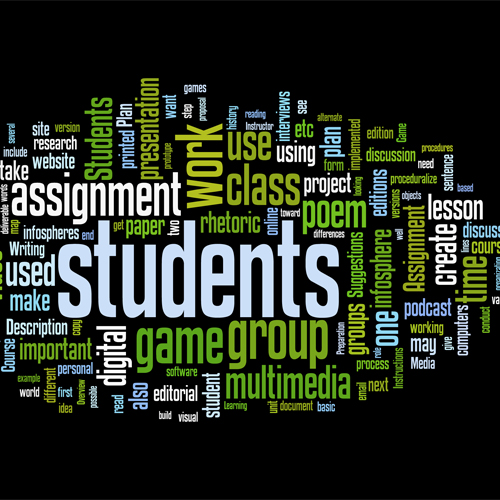You are here
Wordle as a Tool for Research and Invention
Primary tabs

Scott Nelson
This is a short assignment using the free text visualization software, Wordle, to help students find keywords for researching their chosen topics.
The goals for this assignment are to use a data visualization technique to focus students' attention on common terms in a controversy.
The necessary materials are computer and Internet access for all students. The application being used is free online.
This assignment asks students to freewrite and use a online data visualizaiton to find common words in a controversy. This list can then later be used to narrow their searches in online public and provate databases.
There isn't much instructor preparation for this assignment, aside from familiarizing him- or herself with the Wordle interface.
1. To prepare for this activity, I had students freewrite for fifteen to twenty minutes on the topic they chose. Students were to type anything that came to mind about the particular topic, ignoring grammatical mistakes. I stressed that the form didn't matter (lists, bullets, phrases, complete sentences) as long as they got their thoughts down.
2. After the time limit, I gave students another five minutes or so to clean up any spelling mistakes. Grammar didn't matter.
3. We then went to the Wordle website and plugged their text into the box provided under the "Create" tab.
4. Each student was encouraged to randomize the results until they found a visually appealing layout. (This step isn't necessary, but students enjoy it.)
5. We then discussed the wordle results as a class, using students' examples. Using one example, we looked at all of the largest words (the most frequent), and used those to generate synonyms to include in an "or" column on the whiteboard. Different words from the wordle were used to populate other columns.
6. The end result is a map of possible word combinations they could use to research their topic. Combining words in the same column would mean the student would need an "or" operator in the search box; combining words across rows meant the student would use an "and" operator in the search box.
7. Students could print the map to pdf and email it to themselves for later reference.
This was an ungraded assignment, as it was designed to be a fun way to begin research.
Students seemed to like the exercise. While they could conceivably use just the freewrites without the wordles, the introduction of the visual element kept may of them attentive to the assignment. Plus, since they emailed the final pdf to themselves, they could use it for reference later.
When I do this exercise next time, I will probably make the freewriting time longer, or possibly give the freewrite as a homework assignment. This will produce more text and search options.
This course is designed to prepare you for the academic writing you do at the University of Texas and writing you will do in your careers and personal lives beyond UT. It is a course designed to teach you not what to think, but how to think on your own. Ultimately, you should learn to be a better thinker, who is able to think critically about topics, other people, and yourself; a better rhetor, who is able to analyze a specific situation and adjust your writing to fit accordingly; and a better communicator, who is able to express ideas effectively.
It will include three units with each unit culminating in a composition and including writing instruction that supports the drafting of that composition. Composition is a broad term including symbolic efforts in a variety of media (including video, audio, and web-design, to name just a few). Many lower-division RHE courses (such as RHE 315 and 312) encourage or even require composition outside of the traditionally imagined prose essay. Nevertheless, the written component of every lower-division RHE class must meet the writing flag requirements as stipulated by the college. These written assignments may include a variety of genres, including narrative, argument, analysis, or critical reflection. (“Creative” writing assignments—plays, fiction, poetry—are not suitable genres for formal writing assignments.) As required by the college, each major writing assignment includes a peer review process. You will also complete informal writing exercises that prepare you to do the writing necessary in your formal assignments.
-

- Log in to post comments

